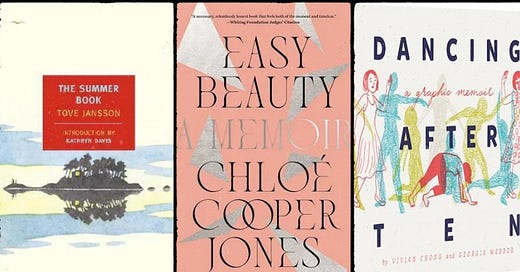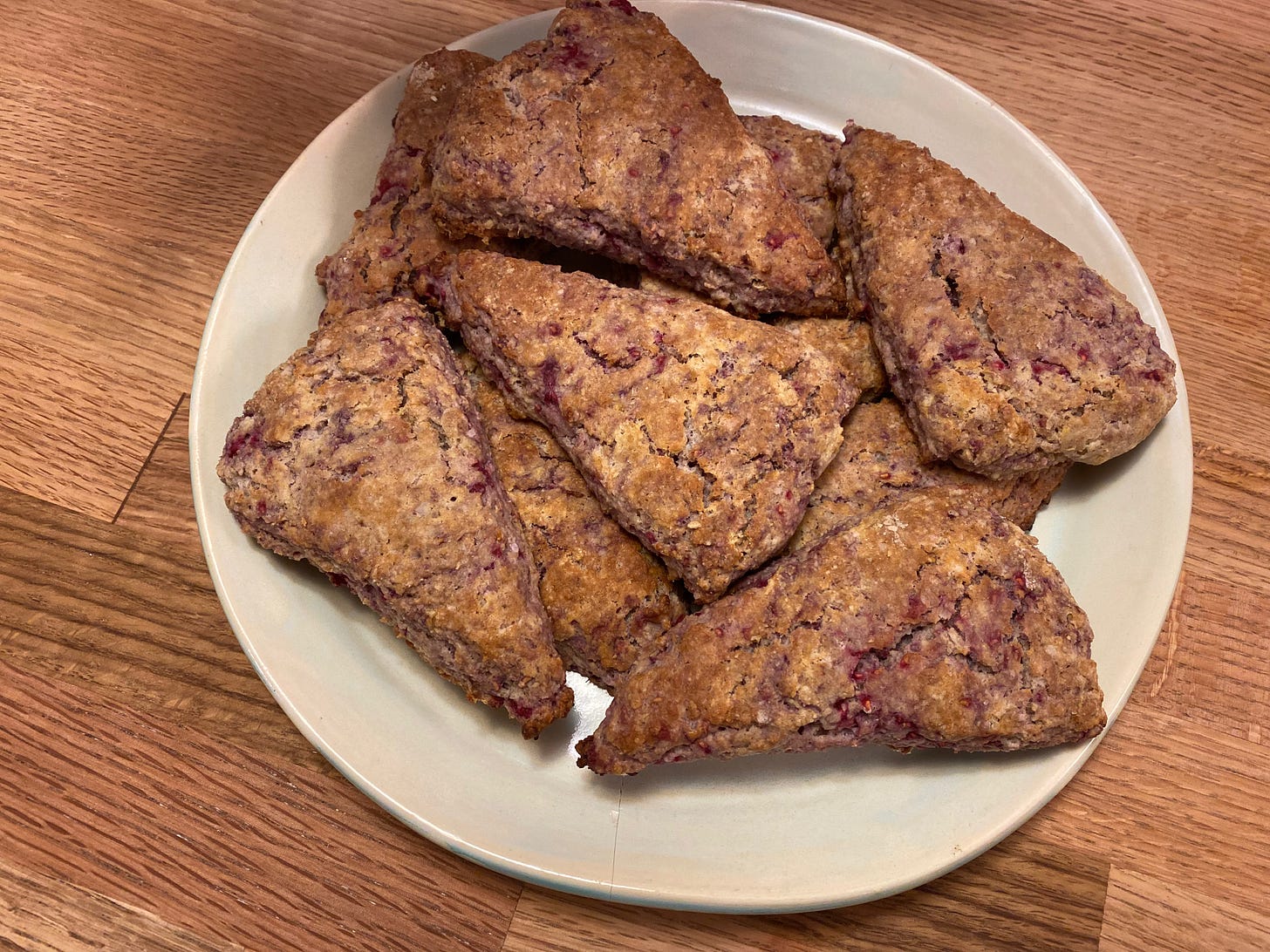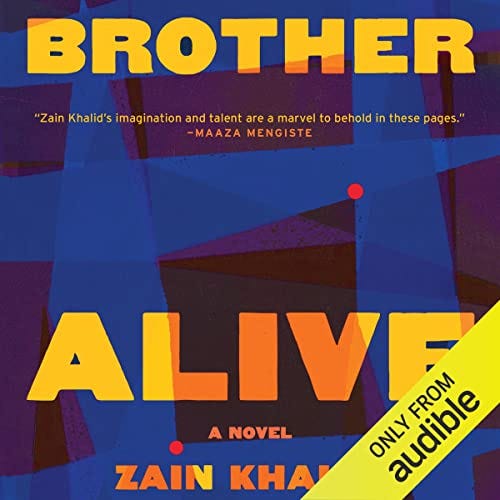Greetings, book-eaters and treat-makers! What a glorious few days it’s been, weather-wise. I did a lot of gasping while driving around the hill towns in my beautiful corner of Western Mass this weekend—the leaves are outrageous. Outrageously perfect. I hope you’ve been able to take some time, even just one minute, to stare in open-mouthed wonder at some little bit of beauty, too. It helps.
I’ve been thinking a lot over the past year about what I want this newsletter to look like in the future. Next week, I’m going on a mini retreat devoted to Books & Bakes in 2023. I’ll be setting goals, reflecting, brainstorming, and doing some reimagining. I already have some exciting plans that I can’t wait to share with you! In preparation, I made an extremely brief survey (there are only two questions)—if you’re so inclined, I’d love to hear from you!
In the meantime, let’s talk about arrival. Or, let’s not, because arrival is a myth. It’s one of the most persistent myths—this idea that one day we will get to where we’re going, that everything will stop spinning, that we’ll find our place, our people, our true love, our calling. As a child this was how I imagined adulthood: as that longed-for arrival, finally, at some mystical end. But of course there is no arrival, and the journey never ends, and finding your place, your people, your true love, your calling—these are just waypoints, tangles, doorways leading to new endings, new beginnings, new messes. I don’t look for arrival anymore, and I’m wary when I encounter it in books. (Unless I’m reading romance, which is built on the fantasy of arrival; finding it is one of the great joys of the genre.) These three books refuse arrival. They are full of moments of arrival—like our lives—but those moments don’t lead anywhere but onward.
The Books
Backlist #1: Dancing After TEN by Vivian Chong and Georgia Webber (Graphic Memoir, 2020)
I’m often surprised by the possibilities of graphic storytelling, which is why it’s one of my favorite mediums. This book is brilliant example of the expansiveness of the form. Vivian Chong was on vacation with a friend’s family when she took an ibuprofen for a headache and had a rare reaction, Toxic Epidermal Necrolysis (TEN). She spent months in a hospital in a coma, and when she woke up, discovered that the scar tissue caused by TEN would eventually cause her to lose her sight.
In this memoir, she recounts her experiences with TEN, the truly horrifying treatment she received from friends and ex-lovers, and her winding journey of getting to know, and live with, her changed body. After a surgery partially and temporarily restored her eyesight, she drew as much of the experience as she could. Later, she collaborated with another disabled artist, Georgia Webber, to create this book. It’s an incredible collaboration. The art is a messy, wonderful mix of styles. Some of the panels are precise, detailed, and neat. Others are abstract, wild, a flurry of shapes and lines. People appear as stick-figures, outlines, shadows. Sometimes they have distinct facial expressions; sometimes they look more like impressions of themselves. The lettering shifts from page to page. Orderly, easy-to-follow panels explode into full-page ruptures—dark smudges that reflect emotional upheaval, or wobbly, winding lines that convey a sense of swirling loss.
The story isn’t linear, and neither is the art. There’s no indication of who drew what. Chong’s drawings, both from before and after she went blind, are mixed with Webber’s drawings, which she made after extensive conversations with Chong. It’s hard to convey how beautiful this is. There’s so much richness in the mess, so many layers. What does it mean to make visual art about blindness? How does Chong’s blindness change the art? What does Webber’s vision bring to it? How do their different ways of seeing and creating complement and clash? Everything about this book challenges the assumptions we have about art and how it’s made. In the afterward, Chong discusses the process, and it got me thinking about translation in all its expansiveness—translation as art form and bridge. There are so many more ways to translate experience than most of us realize. Reading this felt like getting to witness one of those many ways.
Another part of what makes this memoir so powerful is Chong’s longing for arrival. “I will be okay. My skin will heal. I will see again,” she repeats to herself, over and over. “This is temporary,” she says in another panel. “It can only get better.” She repeats versions of these words to herself constantly throughout the book. Her desire for things to go back to the way they were is palpable. “I will see again,” she says, and the words have weight and heft. Who doesn’t long for arrival? All of us long for it. We long for it when something huge and overwhelming happens, like the illness that changes Chong’s life forever. We long for it, too, in smaller, everyday instances: we long to meet the right person, to get through the errands, to find the house of our dreams.
Chong’s vision doesn’t return. There is no arrival, at least not in the stale fairy-tale sense of the word. She arrives somewhere much more interesting and beautiful—in her ongoing life, which is full of new joys and new challenges, unexpected hardships and surprising delights. She arrives in herself. She loses things she once loved, and finds new things to love. It’s not a one-way, inspirational journey toward healing, self-love, and disability pride. She does find those things, but she also finds rage, despair, uncertainty, exhaustion. “Sometimes life is messy,” she says near the end of the book. “I can handle it.” This, I think, is the only kind of arrival any of us can hope for.
Backlist #2: The Summer Book by Tove Jansson, tr. by Thomas Teal (Fiction, 1972)
So far I’ve only read two of Jansson’s books (this one and Fair Play, which I also loved), but I’m starting to think of her as someone who writes, consistently, against arrival. Like Fair Play, this is a blissfully quiet book. Six-year-old Sophia arrives on a tiny island in the Gulf of Finland to spend the summer with her grandmother. Her mother has just died. The grandmother is sharp and prickly, stubborn, loving. The two of them wander all over the island. They go swimming in the early morning, collect stones, watch birds. They row around in their little boat. They talk, calmly and practically, about all sorts of things: the cat, the coming winter, the neighbors, death, art, fishing, food. At one point, they row over to a house on a nearby island, just built by a wealthy newcomer, so that they can break in and have a look around. They are constantly heading off on small adventures like this, although the book has a distinctly domestic feel: nothing much happens.
Sophia and her grandmother don’t discuss the death of Sophia’s mother much, but this death, and grief, and Sophia’s feelings of uncertainty, and the fragility of all life, permeates the novel. Sophia is young and new and interested in everything. Her grandmother is old, approaching her own death, tired, but still deeply engaged in and curious about the world. They talk to each other sometimes like there is no one else in the world, and perhaps, in certain moments between them, there isn’t. These two characters, at such different moments in their lives, take care of each other, delight each other, and comfort each other. The grandmother answers Sophia’s questions bluntly. Sometimes they disagree about something and have little spats. Always, they share their wonder with each other. They pay close attention to tides and bugs, trees and wind, the stars, the rocks.
It’s obvious that this summer is a monumental summer in Sophia’s life. She has just experienced a devastating loss. She’s also experiencing a new kind of freedom. But at some point, she’ll leave the island and go back to her life. At some point, Grandmother will die. They’re both on the cusp; everything is about to change. Yet Jansson is not especially interested in any of this, at least not directly. She remains stubbornly in the present. Grandmother and Sophia move through the world, moment by moment, and it’s these moments, their resolute nowness, that Jansson captures so beautifully. This summer on the island is not separate from what happened before or from what will happen next. It’s not a dreamy idle, set out of time. It is, simply, time passing, and a young girl and an old woman moving through it, together.
Frontlist: Easy Beauty by Cholé Cooper Jones (Memoir)
This beautiful memoir is not only an argument against arrival in its subject matter; it is also anti-arrival in the way it’s structured. Jones circles and circles and circles, returning to moments, ideas, memories, places, relationships, and conversations again and again, from different angles. The book opens at a bar in Brooklyn; she’s having a drink with two colleagues. She reveals that these two men are discussing the worth and value of her life as a disabled woman. And then she moves away from the scene, and doesn’t come back to its full horror for many pages.
There’s a quiet brilliance in the way she does this. It give the memoir a certain narrative drive, a seething tension. But it also illustrates the way a thing can gnaw and stretch and shapeshift inside your head. A deeply hurtful ableist incident doesn’t end when it ends—it lingers. Coping mechanisms learned in childhood blossom and shift, morph, stop working. Motherhood is constant, even as Jones travels far away from her family. For Jones, everything mixes. She’s on a messy journey. She’s trying to find a way to see herself, hear herself, know herself, in a world that refuses to see her. She flings herself across continents and into the work of other writers and philosophers. She grapples and observes and rages and gets quiet. She conveys all of this intense movement with incredible, measured precision. Her writing is so assured. It’s the kind of book that pulls you along, confident, intimate, demanding.
Jones moves from the bar in Brooklyn to a spontaneous trip to Rome. She writes about ancient and modern beauty standards, about an interaction she has with a man in a museum, about attending a Beyoncé concert in Milan, about the microaggressions she endures as a disabled woman traveling alone. She moves from the philosophical to the historical to the personal. She comes back around to the bar, and then she’s moving back through time again, another conversation with different colleagues, a meeting with a student, the birth of her son. The circles tighten even as they widen.
One thing I especially love is the space Jones leaves for us, her readers. This book is packed. It’s about motherhood and disability and pain. It’s about beauty and how beauty functions in the world. It is about academia and writing and travel, hopelessness and family, alcoholism and desire. It’s about the stories the world tells us about bodies, womanhood, marriage, desirability, and the difficult work of rewriting those stories. But Jones is a curious philosopher, more interested in the juicy middle than the unobtainable end. She doesn’t make neat connections. She lays it all out, pondering, exclaiming, meandering—from the ethics of dark tourism to the enraging realities of disabled parenting in an ableist world, from the mistakes she makes she’s made in her own intimate relationships to unexpected moments of joy and connection. She shares her experiences, the ways she has been shaped by her body, by ableism, by her own stubbornness, by the people who love her, by the people who’ve hurt her, by becoming a mother.
This is not a simple or an easy book. Another thing that struck me is how honestly Jones writes about doing things that women are not “supposed” to do. At one point, she leaves her husband and young son to travel to Cambodia, ostensibly to work on her dissertation but really because she’s looking for something inside herself and she needs space. There’s a moment on this trip where she admits that no one in the world knows where she is, that she hasn’t even tell her husband what hotel she’s staying in, that he basically has no way of reaching her. She states this simply as fact.
Is she a good person? Is she selfish, impulsive, irresponsible? Does she put her own needs before the needs of her family? Does she make mistakes? Is she a good mother? Does she push away the people she loves? Does she make sacrifices for her family? Does she sometimes use her disability to get what she wants or needs? Is she hurting, kind, lost? Yes and yes and yes and yes. She is a whole flawed human, a whole flawed mother, a whole flawed disabled woman with a whole flawed body, a whole flawed academic with a whole flawed brain. She writes her whole flawed self onto the page, with wisdom and humor and beautiful bluntness, and it is such a gift.
The Bake
My brother, sister-in-law, and nephews came to visit over the weekend. We picked six pints of raspberries from my favorite spot, and then we got to baking. My sister-in-law made a very tasty almond and raspberry tart. My nephew made a chocolate raspberry cake (yes, we had two desserts). All of this was happening while my brother made pizza for dinner, and in the morning, my nephew and I whipped up these simple raspberry scones. It’s a privilege to be part of family that loves to cook.
Raspberry Ricotta Scones
from Smitten Kitchen
Shockingly, I didn’t mess with this recipe at all. These scones are simple, hearty, and not too sweet. Next time I might add some chocolate chunks, because I like my scones on the dessert end of the breakfast spectrum.
Ingredients
120 grams (1 cup) whole wheat flour
125 grams (1 cup) all-purpose flour
1 Tbs baking powder
50 grams (1/4 cup) sugar
1/2 tsp salt
6 Tbs (85 grams) cold unsalted butter
1 cup fresh raspberries
3/4 cup (189 grams) ricotta
1/3 cup (79 ml) cream
Preheat the oven to 425. Line a baking sheet with parchment paper or a silicone baking mat.
Combine the flours, baking powder, sugar, and salt in a medium bowl.
Cut the butter into small pieces and add it to the bowl. Use your fingertips to work it into the flour until the mixture resembles coarse meal. It’s okay if there are still a few bigger pieces. Coarsely chop the raspberries and stir them into the mixture (feel free to continue using your hands). Add the ricotta and cream and give the mixture a few good turns with a wooden spoon, until it collects into a dough at the bottom of the bowl.
Turn the dough out onto a floured surface and gently pat it into 7-inch (ish) circle. Cut it into 6-10 wedges, depending on what size scones you like.
Transfer the scones to the prepared baking sheet and bake for about 15 minutes, until lightly golden on top. Next time I’d throw on an egg wash and some coarse sugar.
The Bowl and The Beat
The Bowl: Lunch from the Pantry Red Lentil Soup
Whenever I can, I take the time to cook something in the middle of the day. I’m always exhausted and hungry after work, and I often don’t have the energy to make a good meal. But if I’m organized enough to cook something for lunch, I can eat the leftovers for dinner! I made this quick and simple soup the other day. I kept finding that I didn’t have things I wanted to put in it (coconut milk, chicken stock, carrots) but it turned out delicious anyway.
Dice an onion and sauté it in some olive oil. Add salt and pepper, a few minced garlic cloves, and the spices of your choice—for me, this time: cumin seeds, red pepper flakes, and smoked paprika. Add 2-3 diced potatoes and cook for a few minutes more, to let the potatoes brown a bit. Add four cups of liquid (broth is good if you have it, water is fine if not) and a cup of red lentils. Simmer until the lentils are soft, 20-30 minutes. Remove about half the soup and puree it with an immersion blender. Return it to the pot and stir in the juice of a lemon. Mix well adjust seasonings to taste.
The Beat: Brother Alive by Zain Khalid, read by Fajer Al-Kaisi
This has been on my radar for a while, but I got even more excited about it when I learned it was one of the two books Alexander Chee picked for the American Fiction Series box he’s curating for Boxwalla. I loved his other pick, The Town of Babylon (I know you know), and also, Alexander Chee is a national treasure. So far I’m loving this! It’s about three brothers who live with their adoptive father, an imam, above his Staten Island mosque. It’s narrated by one of the brothers, Youssef, who has a double he names Brother—a creature who can take any form, who accompanies him everywhere, and to whom he feeds knowledge and memories. It’s one of those maybe-magical stories that I love, where the maybe-magical elements are small enough that they might be real. The writing is lovely. I’m only about two hours in, and I find myself wanting to return to it every chance I get.
As an aside, Audible exclusives make me furious. I often get access to them because I review audiobooks for Audiofile. I’m grateful—the narration of this is excellent—but the inaccessibility (libraries can’t even get them!) is awful. I hate it.
The Bookshelf
A Picture
Here’s a fun graphic from my Library Thing catalog, showing where I acquired all the books I own! ‘Purchased’ includes all the books I know I bought but have no idea where from, and ‘Base Collection’ includes books I’ve had since childhood or took from my childhood home. ‘Other’ represents a ton of indie bookstores I’ve bought only one or two books from over the years. It’s exciting to see my current local indies (shoutout to Broadside Bookshop, Everyone’s Books, and Roundabout Books!) alongside my once-local indies.
Around the Internet
On Book Riot, I made a list of exciting new cookbooks that are coming out this fall. Then I got very hungry.
Bons Recs Against Arrival
I know I’ve mentioned Eli Clare in past bonus recs sections, but I can’t publish this newsletter without mentioning his incredible book Brilliant Imperfection. Two other works of nonfiction I’ve read this year that come to mind: Pain Studies by Lisa Olstein and The Trayvon Generation by Elizabeth Alexander.
The Boost
This calendar goes on sale on Friday and I will be doing the online equivalent of getting in line bright and early.
As always a little bit of beauty to send you on your way: It’s October. Every walk is almost too beautiful to believe.
Catch you next week, bookish friends!










Thank you for shouting out Broadside!! :)